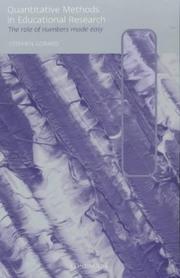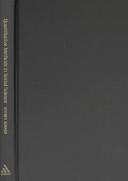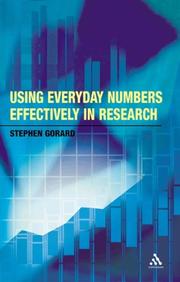| Listing 1 - 10 of 22 | << page >> |
Sort by
|
Book
ISBN: 9780367258832 9780367258801 Year: 2020 Publisher: Abingdon, Oxon ; New York, NY : Routledge,
Abstract | Keywords | Export | Availability | Bookmark
 Loading...
Loading...Choose an application
- Reference Manager
- EndNote
- RefWorks (Direct export to RefWorks)
"Worldwide, there has been considerable progress in the quality of research evidence generated for use in education, but not the equivalent growth in knowledge of how best to get this evidence into actual use. Yet with far-reaching implications, all of education is damaged when persuasive but poor-quality evidence has widespread influence, or good research lies unused. Focused on the work of the Durham University Evidence Centre for Education, Getting Evidence into Education addresses this problem, examining what can be done to improve the take-up of suitable research evidence and inform the public service of education. Containing a variety of case studies, from evidence-based policies for early childhood education in Brazil, to the use of evidence on contextualized admissions to Scottish universities, the volume explores a variety of different ways to approach the problem, addressing the questions: What is the existing evidence on different approaches to getting research evidence into use? What are the factors which influence the uptake of high-quality research evidence by policy or practice? Which are the most effective pathways for evidence-into-use in particular contexts? Considering both the practical and ethical implications, the book builds towards key recommendations for the research community, practitioner bodies and policy-makers and advisors, directing them on how to communicate better with each other for the benefit of everyone"--
Education --- Education and state. --- Research. --- Methodology. --- Aims and objectives.
Book
ISBN: 1447342186 1447342216 144734216X 9781447342168 9781447342182 9781447342199 1447342194 9781447342144 1447342143 9781447342151 1447342151 Year: 2018 Publisher: Bristol : PolicyPress,
Abstract | Keywords | Export | Availability | Bookmark
 Loading...
Loading...Choose an application
- Reference Manager
- EndNote
- RefWorks (Direct export to RefWorks)
Supported by twenty years of extensive, international research, this approachable text brings invaluable insights into the underlying problems within education policy, and proposes practical solutions for a brighter future.
Education and state. --- Education --- Education policy --- Educational policy --- State and education --- Social policy --- Endowment of research --- Government policy

ISBN: 0826453074 9780826453075 Year: 2001 Publisher: London: Continuum,
Abstract | Keywords | Export | Availability | Bookmark
 Loading...
Loading...Choose an application
- Reference Manager
- EndNote
- RefWorks (Direct export to RefWorks)
Book
ISBN: 9781446249024 9781446249017 Year: 2013 Publisher: Los Angeles, Calif. Sage
Abstract | Keywords | Export | Availability | Bookmark
 Loading...
Loading...Choose an application
- Reference Manager
- EndNote
- RefWorks (Direct export to RefWorks)
Book
ISBN: 9781526413826 9781526413819 Year: 2021 Publisher: Los Angeles, Calif. Sage
Abstract | Keywords | Export | Availability | Bookmark
 Loading...
Loading...Choose an application
- Reference Manager
- EndNote
- RefWorks (Direct export to RefWorks)
Book
ISBN: 9781847873279 Year: 2008 Publisher: Los Angeles, Calif. Sage
Abstract | Keywords | Export | Availability | Bookmark
 Loading...
Loading...Choose an application
- Reference Manager
- EndNote
- RefWorks (Direct export to RefWorks)

ISBN: 0826465870 0826465862 Year: 2003 Publisher: London : Continuum,
Abstract | Keywords | Export | Availability | Bookmark
 Loading...
Loading...Choose an application
- Reference Manager
- EndNote
- RefWorks (Direct export to RefWorks)
Social sciences --- Sciences sociales --- Research --- Methodology. --- Recherche --- Méthodologie
Book
Year: 2020 Publisher: Abingdon, Oxon New York, NY Routledge
Abstract | Keywords | Export | Availability | Bookmark
 Loading...
Loading...Choose an application
- Reference Manager
- EndNote
- RefWorks (Direct export to RefWorks)
"Worldwide, there has been considerable progress in the quality of research evidence generated for use in education, but not the equivalent growth in knowledge of how best to get this evidence into actual use. Yet with far-reaching implications, all of education is damaged when persuasive but poor-quality evidence has widespread influence, or good research lies unused. Focused on the work of the Durham University Evidence Centre for Education, Getting Evidence into Education addresses this problem, examining what can be done to improve the take-up of suitable research evidence and inform the public service of education. Containing a variety of case studies, from evidence-based policies for early childhood education in Brazil, to the use of evidence on contextualized admissions to Scottish universities, the volume explores a variety of different ways to approach the problem, addressing the questions: What is the existing evidence on different approaches to getting research evidence into use? What are the factors which influence the uptake of high-quality research evidence by policy or practice? Which are the most effective pathways for evidence-into-use in particular contexts? Considering both the practical and ethical implications, the book builds towards key recommendations for the research community, practitioner bodies and policy-makers and advisors, directing them on how to communicate better with each other for the benefit of everyone"--

ISBN: 1283202573 9786613202574 1441108807 9781441108807 9781283202572 9780826488305 0826488307 Year: 2006 Publisher: London Continuum
Abstract | Keywords | Export | Availability | Bookmark
 Loading...
Loading...Choose an application
- Reference Manager
- EndNote
- RefWorks (Direct export to RefWorks)
Can you add up the number of students in your classroom? Can you tell which of two test scores is the larger? Can you programme a video or DVD recording using a 24-hour clock? If so, then this book will show you how everyday numbers like these can also be used to make your research more powerful, and enable you to spot the abuses of number that are as common in research as they are in everyday life. This book illustrates how numbers can be used routinely and successfully for research purposes - without you ever having to consider confidence intervals, probability densities, Gaussian distributi
Research --- Methodology. --- Statistical methods.
Book
ISBN: 9781412995559 Year: 2011 Publisher: [Thousand Oaks, Calif. : SAGE],
Abstract | Keywords | Export | Availability | Bookmark
 Loading...
Loading...Choose an application
- Reference Manager
- EndNote
- RefWorks (Direct export to RefWorks)
The speaker says that you only choose your methods once you know the right questions to ask. Once you have those, the method of research should be fairly obvious. Finding the right questions is an area which he suggests is currently underdeveloped in research methods training.
Social sciences --- Research --- Methodology. --- Evaluation.
| Listing 1 - 10 of 22 | << page >> |
Sort by
|

 Search
Search Feedback
Feedback About UniCat
About UniCat  Help
Help News
News